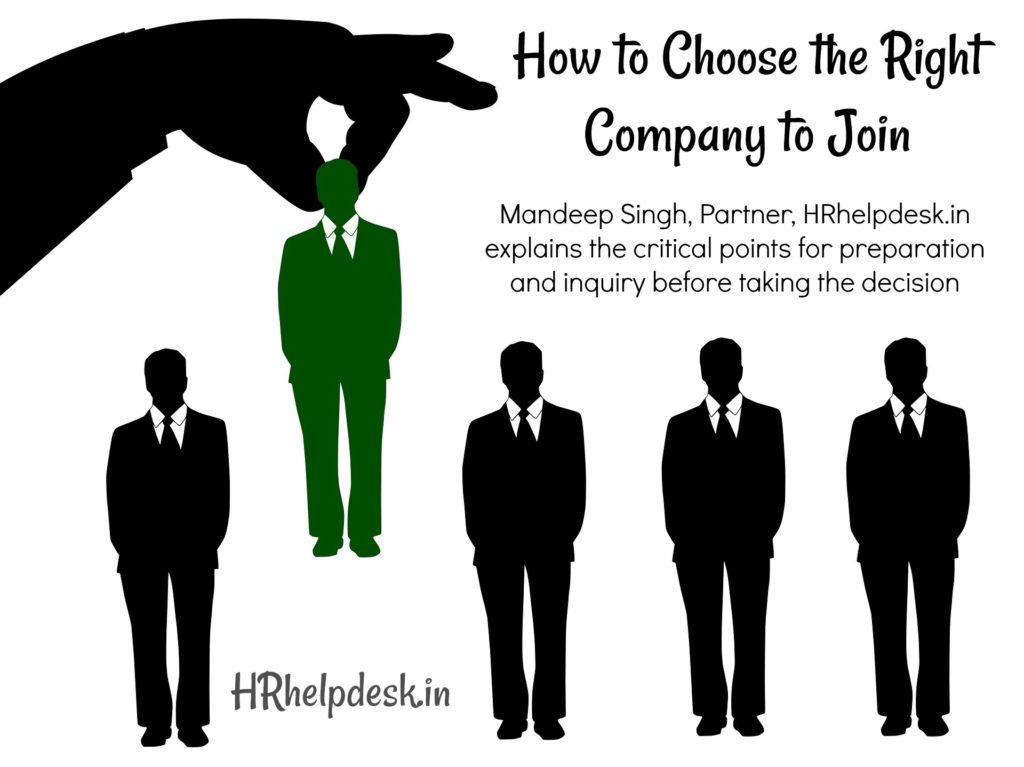How to Choose the Right Company to Join
By Mandeep Singh
Partner, Talent & Rewards, www.hrhelpdesk.in

Today we will talk about choosing the right company.
When we go job hunting looking for opportunities to get into an organization we have a perception and mindset as to what company is the best for us in what a company will offer us as a career opportunity which is going to be really exciting for us to be engaged in.
Once we get into this process of getting into an organization and if we get an interview call, then the company or the organization spends a lot of time trying to gauge us trying to understand us.
Preparing for the Interview
You go through number of interviews from the first introductory interview to technical interviews to technical assessments to psychometric assessments so much so that the company will also get into doing background checks. Not only will it check what is it that you have done in the previous company how is it that you performed in the previous company but also will check your integrity.
They will get to the level of trying to find out whatever you have declared to have done in the company by way of your resume – have you really done that?
That’s the level of things that the organisation gets into. In this bargain the company will also ask us a lot of information which may or may not be required but we end up sharing that information with them just in the hope of getting into that organization because in our perception that is the right organization for us and that organization will help us build a strong career.
What we are talking today is not how we should deal with the organization and what is it that we should and should not be telling in the interviews. We are going to talk about the other thing which is what is it that I should do to be sure that the organization I am joining and the organization I am being interviewed for is actually the best organization for my career.
Checking the Organization
There are two ways in which we do that. First we check what kind of an organisation it is and second we check what kind of managerial hierarchy I have.
When I say managerial hierarchy and I mean what kind of a supervisor that I have and what kind of a skip level supervisor I have.
When you start the process of checking the organization and whether that really is the best organization for you to build a strong career in. You start by the process of trying to gauge and understand how you were treated in the various interactions the company has had with you. Predominantly your interactions at this stage revolve around the interview and the selection process.
You need to try and understand was this organization treating you with respect and as a guest or was this organization trying to treat you as somebody who is desperate and who needs to get into this job.
Evaluating the Offer
The way the offer process is designed and the way the offer is rolled out whether it is trying to make you make some sacrifices to join the organisation on the financial front or on the other fronts. Or is the organisation really considerate about the terms of joining the organization. Strong companies would have a bouquet of offerings that they would offer you. It would not revolve around too many sacrifices or too many choices that you have to make which make you demotivated.
It will revolve predominantly around what is the financial package they’re giving you and the financial package if not really exciting would be decent enough to make you happy joining the organization.
Understanding the Training Opportunities
The training that the organisation offers, the kind of rotations of projects that the organisation offers – are all going to be something that is going to help you make up a decision that this is the organization which makes me feel happy. This is the option which is investing in me.

Lot of companies would say numerous things about the training which in a way is the investment the organisation is doing into you. You have to try and find out how this training really translates into action. Training are not the standard training that an organization gives. Training are not the various programs that an organisation expects you to go through.
What we are talking about over here are the training which really impact your resume which means those are the training which help you enhance your skills. You get certifications or you get such exposures which you can actually use to set yourself at a much higher cost outside this organisation. Those kind of investments if an organization is providing in you, you should be able to weigh yourself in terms of financial salary.
Inquiring About the Culture
It’s also important for you to understand the organization culture. What this organization culture is the way people behave, its the way people treat each other and its the way people live in that organization. And the best way to do that is by talking to certain ex-employees or by talking to certain new employee – employees who have joined in the span of 0 to 1 year. They are the ones who are trying to understand the culture or they are the ones who have lived the culture and already exited that organization.
Finding individuals who have been in the organization or have already exited the organisation is not such a difficult task. You can go to social media and find such people, reach out to them ask them what kind of an organization is it. Reach out to the hiring managers, reach out to the interviewing managers and ask them what kind of an organisation culture it is. The more you understand the culture the easy and the better it will be for you to assimilate it to the organisation.
Do some research on social media sites to find out if there are too many negatives written about the organization. If so ask your interviewing managers to ask the other ex-employees or 0 to 1 year employees about those to clarify.
Finding Out About Your Managers
The other aspect which you need to be really careful about and you really need to check about is your manager and the Skip level manager. As an individual employee the organization is an environment the organization is a culture, the organization is universe.
However your career and your day-to-day experience in the organization is dependent on your supervisor and your skip level supervisor. Therefore it is very essential for you to really figure out how are your these two managers in terms of people managers. An ideal people manager who’s good at his or her work would have lot of subordinates saying good things about them. And the best way to figure that out today is in the social media.
Go to the social media and look at the profile of your supervisors. You will be able to see at least two to three subordinates talking good about these people consistently over a period of 2-3 roles. For average managers or bad managers you will find this aspect missing. Either you’ll have one subordinate speaking here there or you will have very few subordinates talking about this manager.
A good manager will have subordinates talking about good aspects of this manager consistently over a period of roles and over a period of jobs. What you also need to be aware of that as a manager the manager should have a 360 degree of positives written about them. You do not want a manager who does not have any positives or the supervisor side but has too many positives on the subordinate side.
A good manager would have a 360 degree of positive written about them not only subordinates but even supervisor would have said good things.
These are the balanced managers whom you should look at getting into. Ideally you would find social media giving such information. If you do not have this information on social media feel free to ask this information during the interim processes to get information about this.
Knowing About the Questions You Can Ask
The most important part is to check the manager because as a manager and a skip level manager they control more about your profession destiny than the organization does. The last thing that you really need to be aware of is when and what kind of questions can I ask.
Will it be taken offensive if I were to say something negative of the company?
Will it be really answered in the proper way?
If I want to ask some really difficult questions?
So the straight answer is to strategically position those questions.
You do not put these questions during the interview process. You put these questions at the time of decision-making and the decision-making happens after the offer is rolled out but before the offer acceptance happens. That is the time when the organization is most receptive to you. That is the time when the organization is willing to share the maximum amount of information with you.
Therefore at that time by clearly saying I would like clarity on these things, you can ask any kind of question which you feel is offensive or which will be difficult for the organisation to answer but it is essential that you ask these questions and on the basis of your research you take a decision.
Taking the Decision
Do not take decisions on the brand value of the organisation. Do not take decisions on the perceptions of your colleagues, of your friends on an organization. Specifically do not take decisions on the ideas and the mind sets you have about the organization or because the social status of an organization is great.
Take decisions on what and how the organisation does to treat its employed and what kind of a manager and skip level manager you are going to be working under. If these two combinations make sense to you get into that organization and build a strong career for yourself.
